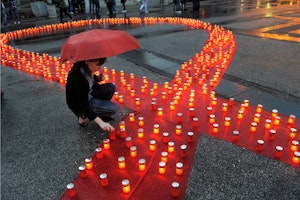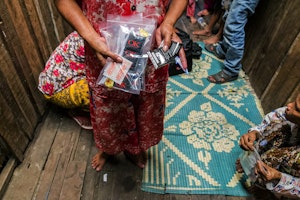How Social Accountability Protects Health Rights
By Jamila Headley

Promoting and protecting the right to health, including access to health services, is widely acknowledged to be the responsibility of the state. Yet many governments around the world fail to meet these obligations, particularly to their marginalized populations.
For example, in Eastern Europe and Central Asia, although the majority of people living with HIV or AIDS use injection drugs, most governments invest little to nothing in harm reduction programs that prevent the spread of HIV. In Central and Southeast Europe, Roma populations often have much less access to health insurance and lower child vaccination coverage rates than their non-Roma neighbors.
Social accountability initiatives mobilize citizens to protect their rights, and they yield real results. By leveraging evidence to demand that their needs are taken into account, citizens can develop more responsive governments, reduce corruption, and improve the quality and availability of health care.
What is “social accountability”?
All states have obligations to their citizens, and citizens in turn have a right to demand accountability from the state. Social accountability is the active participation of citizens or civil society in holding governments responsible for meeting their obligations. Social accountability initiatives empower citizens—including those most marginalized by society—to monitor how governments allocate resources and deliver services, to demand that their needs are taken into account, and to mobilize for change.
What are social accountability tools and practices?
Citizen-led methods for holding government accountable have traditionally included public protests and advocacy campaigns. However, over the last decade social accountability increasingly refers to a range of newer tools and practices for evidence-gathering and analysis that often involve more direct interaction with government institutions, service providers, or decision-makers. These tools include the following:
Community monitoring is the systematic documentation of the quality and accessibility of government services—from education and health care, to garbage collection—against specific standards and policy commitments. This work helps citizens press providers and policymakers for improved policies and services. Community monitoring tools include
- community scorecards, which are used at the local-level by communities themselves to conduct qualitative evaluations of public services, projects or institutions and involve a meeting between service-providers and community members to share results;
- citizen report cards, which are surveys administered by citizens that provide quantitative feedback on the quality and accessibility of public services from actual users;
- social audits, which are community assessments of the impact of government projects or services that involve comparing the proposed and real benefits along with any unexpected challenges or negative effects associated with implementation.
Applied budget work is citizen monitoring and analysis of, and advocacy around, government plans for raising and spending public resources. Complex budget information, such as reports of government revenue sources, and proposed allocations or actual expenditure for a particular sector or services, is collected by citizens is translated in ways that are understandable by both the general public and by decision makers. This is then used in citizen-led budget advocacy in order to influence budget choices.
How do the Open Society Foundations promote social accountability to advance health and rights?
The Open Society Foundations support citizen groups and civil society to collect and analyze evidence about the accessibility, quality, and financing of health services, and to use this evidence to press for change. For example:
- In the Republic of Macedonia, Association for the Emancipation, Solidarity and Equality of Women (ESE) and Mesecina (a Roma grassroots advocacy organization) published research showing that Roma children had lower immunization rates and pointed to insufficient budget allocations as a likely cause. As a result, the government has adopted measures to improve immunization access. ESE is now collaborating with three Roma organizations—NGO “KHAM,“ Centre for Democratic Development and Initiatives, Association of Educational Workers and Protection of the Rights of Women and Children—to document the quality and accessibility of preventative health and vaccination services for Roma children in eight municipalities and to compare this information to national standards and policies. Together, these organizations are pressing the government.
- In Guatemala, the Center for the Study of Equity and Governance in Health Systems (CEGSS) has been supporting indigenous communities in rural areas to monitor the quality and availability of health services. These communities have successfully used evidence of corruption and poor performance, obtained through community monitoring, to successfully advocate for the termination of contracts for two underperforming and corrupt providers of health services. CEGSS is also working with the communities to integrate mobile and internet-based technology to speed up their monitoring of the availability of essential drugs, medical supplies, and presence of health personnel.
- In South Africa, the Public Sector Accountability Monitor is analyzing government budgets to advocate for improvements in the financial management and delivery of health services in the Eastern Cape, the province with the worst health outcomes in the country.
- In Zimbabwe, the Community Working Group on Health supports communities to monitor and improve HIV and AIDS services in primary care facilities. In 2011, monitors at a clinic in Kwekwe identified wait times of more than 5 hours as a major barrier to HIV services. Based on these findings, citizens successfully petitioned decision-makers and service-providers, resulting in the deployment of four additional nurses and significant reductions in wait times.
- The Ukrainian Community Advisory Board (otherwise known as Patients of Ukraine) is working to empower patients to monitor how government procures their medicines. In a country where the price paid for medicines is often significantly higher than what is paid in neighboring countries, Patients of Ukraine is working to promote transparency, deter corruption and to ensure that the government’s limited resources are used to full effect.
Until December 2014, Jamila Headley was a program officer with the Open Society Public Health Program.

